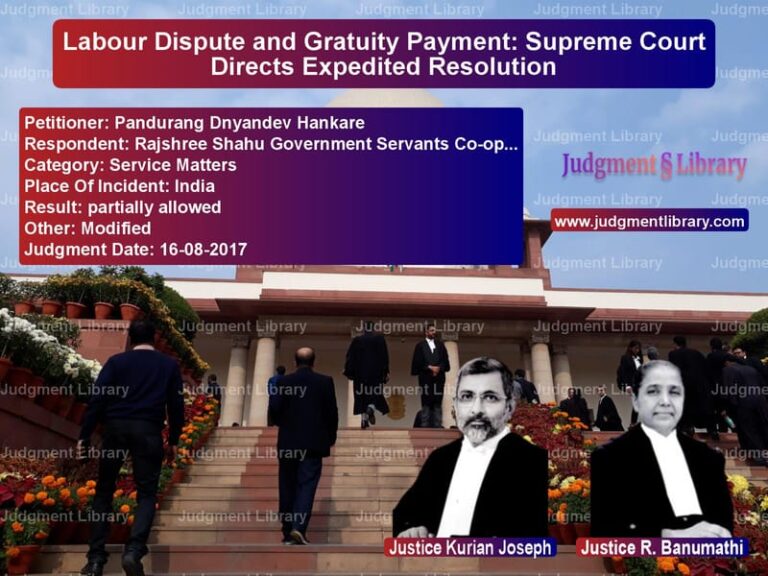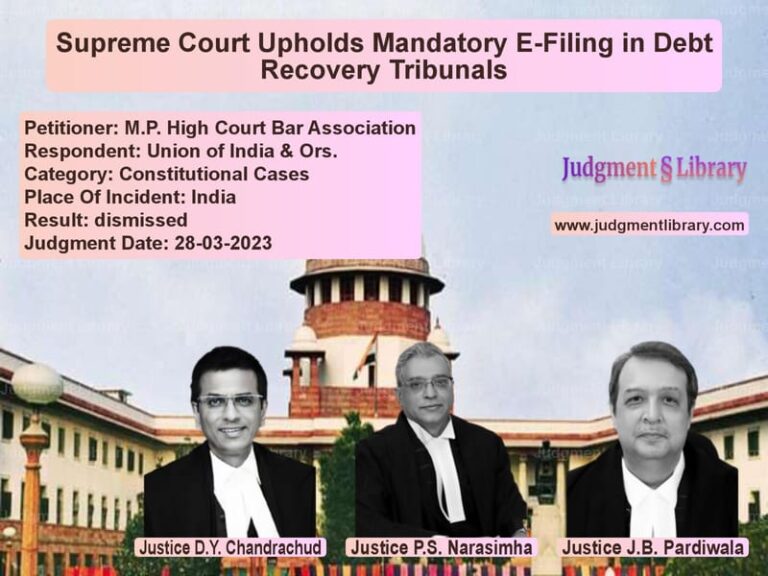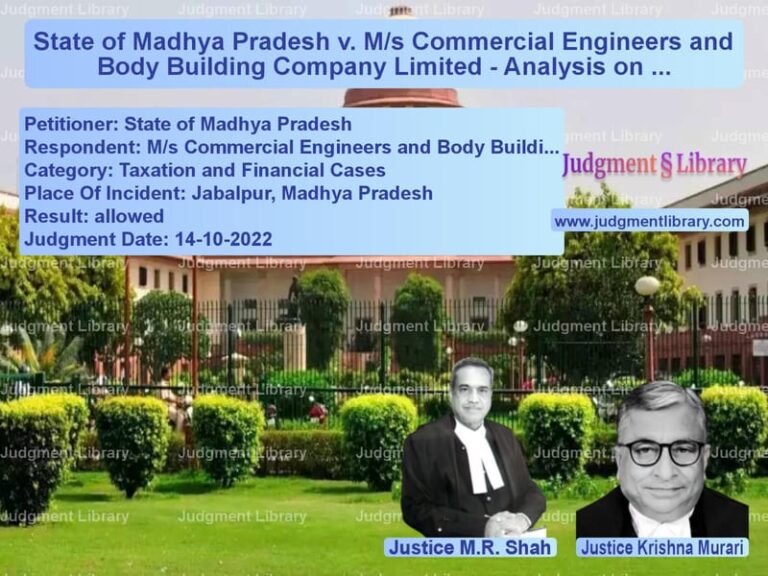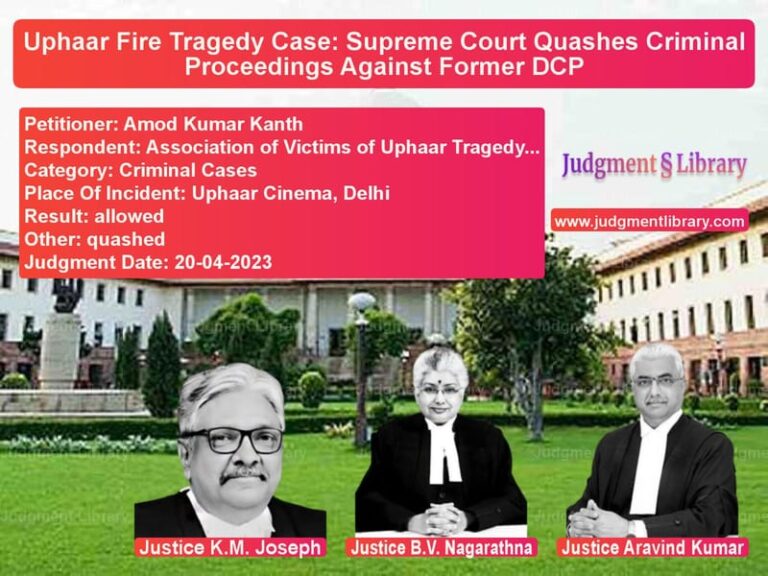Pension Rights and Employment Regulations: Supreme Court’s Verdict on PEPSU Road Transport Case
The Supreme Court of India, in the case of PEPSU Road Transport Corporation, Patiala vs. Amandeep Singh & Ors., addressed a critical issue regarding pension entitlements and the procedural requirements under the PEPSU Road Transport Corporation Employees/Pension Gratuity and General Provident Fund Regulations, 1992. The case revolved around the question of whether an employee who had not explicitly opted for the pension scheme within the stipulated period could later claim pension benefits after retirement. The Court provided clarity on the mandatory opt-in requirement and the role of procedural compliance in pension claims.
Background of the Case
The dispute originated when Balwant Singh, a former driver at PEPSU Road Transport Corporation, retired on November 30, 2000. Upon retirement, he received his contributory provident fund (CPF) benefits. However, he later filed a suit demanding pension and commuted pension benefits under the 1992 Regulations, arguing that he had not been properly informed about the pension scheme.
His claim was initially upheld by the Trial Court, which ruled in his favor and directed the Corporation to provide pension benefits. The judgment was later affirmed by the Appellate Court and the Punjab & Haryana High Court. Aggrieved by these decisions, PEPSU Road Transport Corporation appealed to the Supreme Court.
Regulations Governing Pension and CPF
The PEPSU Road Transport Corporation Employees/Pension Gratuity and General Provident Fund Regulations, 1992, introduced a pension scheme applicable to employees who:
- Were appointed on or after the date of issue of the regulations on a full-time and regular basis.
- Were working immediately before the issuance of the regulations and exercised an option to be governed by these regulations.
Under Regulation 4, employees were required to opt for the pension scheme within six months from the date of issue of the regulations. If an employee failed to opt for the pension scheme within this timeframe, they were deemed to have chosen to continue under the CPF scheme.
Petitioner’s Arguments
The Corporation presented the following arguments:
- The pension benefits were only available to employees who had explicitly opted for the pension scheme within six months.
- Balwant Singh had not exercised the option, nor had he refunded the CPF amount as required under the pension scheme.
- The regulations were duly communicated to employees through notices placed on notice boards at headquarters and depots.
- The Corporation was not required to serve individual notices to employees regarding the pension scheme option.
Respondents’ Arguments
The respondents countered with the following points:
- The pension scheme was not adequately communicated to employees, and Balwant Singh had never explicitly opted out of it.
- The Corporation should have individually notified employees about the need to opt for the pension scheme.
- The failure to provide pension benefits violated principles of fairness and natural justice.
- As Balwant Singh was unaware of the scheme, he could not be penalized for not opting in.
Key Observations by the Supreme Court
- The Court noted that the 1992 Regulations clearly required employees to opt for the pension scheme within six months, failing which they would continue under the CPF scheme.
- The requirement of personal service of notice was not necessary since the regulations were made available at headquarters and depots.
- The Court referred to previous rulings, including PEPSU Road Transport Corporation vs. Mangal Singh, which upheld similar provisions.
- The deeming provision in Regulation 4 ensured that non-exercise of the option led to automatic continuation under the CPF scheme.
Precedents Cited
The Supreme Court relied on its previous judgment in PEPSU Road Transport Corporation vs. Mangal Singh, where it was held that:
“Failure to exercise an option within the prescribed period results in the employee being governed by the CPF scheme. The pension scheme cannot be claimed retrospectively once the option period has lapsed.”
The Court also referred to Rajasthan Rajya Vidyut Vitran Nigam Limited vs. Dwarka Prasad Koolwal, which reiterated that service of individual notices was not mandatory where the regulation itself specified a clear timeline for opting into a scheme.
Final Judgment
The Supreme Court ruled in favor of PEPSU Road Transport Corporation, setting aside the decisions of the High Court, Appellate Court, and Trial Court. The Court stated:
“The pension scheme was applicable only to those who exercised their option within the prescribed period. The respondent, having failed to do so, cannot claim pension benefits retrospectively.”
Implications of the Judgment
This ruling has significant implications for pension-related disputes in India:
- It reinforces the principle that employees must comply with prescribed procedures to claim benefits.
- The judgment clarifies that pension schemes requiring an explicit opt-in are legally valid and binding.
- It sets a precedent for similar cases where employees claim benefits without following due process.
- Employers are not required to serve individual notices for policy changes when general notices are sufficient.
Analysis and Future Implications
The judgment highlights the importance of procedural compliance in employment benefit claims. Employees must actively engage with policies affecting their post-retirement benefits rather than assuming entitlement. This decision may encourage organizations to ensure their employees are well-informed about opt-in provisions, but it also places the responsibility on employees to stay informed.
The ruling also discourages litigation based on procedural oversight, ensuring that pension claims are handled efficiently within the legal framework. This case will likely serve as a guiding precedent for future disputes involving pension schemes and opt-in provisions.
Conclusion
The Supreme Court’s ruling in this case highlights the importance of procedural compliance in pension claims. By affirming the necessity of opting into the pension scheme within a stipulated period, the judgment ensures clarity and consistency in employment benefit regulations. This decision reinforces that pension benefits cannot be claimed retrospectively without fulfilling regulatory requirements, setting a critical precedent in service-related matters.
Don’t miss out on the full details! Download the complete judgment in PDF format below and gain valuable insights instantly!
Download Judgment: PEPSU Road Transport vs Amandeep Singh & Ors Supreme Court of India Judgment Dated 03-01-2017.pdf
Direct Downlaod Judgment: Direct downlaod this Judgment
See all petitions in Pension and Gratuity
See all petitions in Judgment by S. A. Bobde
See all petitions in Judgment by Ashok Bhushan
See all petitions in allowed
See all petitions in Quashed
See all petitions in supreme court of India judgments January 2017
See all petitions in 2017 judgments
See all posts in Service Matters Category
See all allowed petitions in Service Matters Category
See all Dismissed petitions in Service Matters Category
See all partially allowed petitions in Service Matters Category







